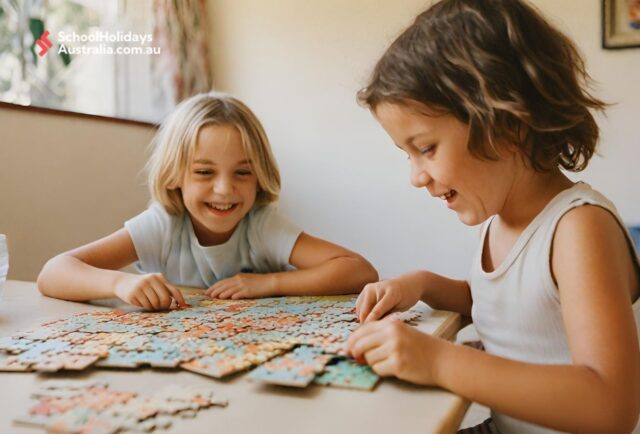Recently, we noticed that many parents find teaching puzzles quite challenging. Some even think that early puzzle-solving is merely a mechanical memory exercise for kids. My little kid started doing puzzles at eleven months, and now she can independently complete a 100-piece mermaid puzzle!
Playing puzzles is a highly beneficial experience for children. It requires minimal space and has low costs, yet it enhances a kid’s concentration, abstract thinking abilities in piecing images together, and fine motor skills. Today we have invited Grace from the puzzle-shop.com.au, to talk about how puzzles help child development! And for those who don’t know about Grace, she has years of experience analysing the trends in the puzzle world.
While this puzzle may not be a challenge for gifted children, the gradual increase in the number of pieces your kid can complete has led to substantial improvements in various areas of their development.
Benefits of Puzzle Play
Children who regularly engage in puzzle games can experience significant enhancements in the following skills:
Observational Skills
Assembling a jigsaw puzzle demands keen attention to detail. Children must identify related puzzle pieces in a pile of fragments based on various clues such as color, shape, and pattern relationships.
Concentration
Concentration is a skill highly valued by parents. Puzzle games effectively nurture a child’s ability to focus entirely on observation, searching, and puzzle-solving (with younger children, discussion with a parent is also involved).
Planning and Layout Skills
How can a disarray of puzzle pieces be organised into a coherent whole? This necessitates planning and arrangement. Some individuals prefer to assemble the border pieces first, while others prefer to complete sections gradually and then integrate them into a whole. Different strategies require different perspectives, involving spatial thinking – a more advanced skill that may pose challenges for younger children but can be a goal to strive for.
Resilience
Puzzle games frequently present challenges, such as struggling to find connected pieces or reaching a dead-end in the puzzle. Faced with these difficulties, children might give up or become frustrated. We often speak of cultivating a child’s resilience, and this is a fantastic opportunity to do so.
Independent Problem-Solving
Our ultimate goal in jigsaw puzzles is to enable children to independently discover solutions. This skill nurtures a child’s capacity for independent reasoning. Equipped with this skill, children can navigate obstacles with determination in their future studies, work, or life.
Self-Checking and Error Correction
Jigsaw puzzles have a unique feature. When a piece is incorrectly placed, it eventually becomes apparent, as there is always a piece that simply won’t fit. This is when a child needs to backtrack, identify the source of the error, and rectify it. Recognising errors, making corrections, and ultimately succeeding are valuable lessons.
Common Mistakes Parents Make
When guiding children in puzzle play, parents often make mistakes in minor operational details. Ironically, these seemingly insignificant details can deter children from enjoying puzzles or prevent them from improving their skills.
Correcting Errors Instantly
If a child makes a mistake while playing, parents may immediately correct it, robbing the child of the opportunity to self-check and self-correct.
Providing Answers Instead of Clues
If a child seems stuck, parents sometimes give away the answer instead of offering clues or hints. Providing guidance is more productive; it helps children discover clues, find a breakthrough, and build confidence.
Directing the Entire Process
Some parents are overly involved and direct the entire process, offering their opinions continually. This can disrupt a child’s independent thinking and focus.
How to Guide Children to Fall in Love with Puzzles
Offer Clues and Hints
When a child seeks help, parents should provide clues or hints rather than immediate answers. For example, suggest looking for pieces with a specific color or shape.
Choose Age-Appropriate Puzzles
Select a variety of puzzles that match a child’s skills and interests, gradually increasing the complexity as they progress.




